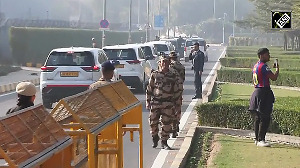The media have been highly critical of Justice Liberhan for having taken 17 years to submit a report on the demolition of Babri Masjid in 1992. While the criticism of Justice Liberhan is surely warranted, few have questioned how the government, as a whole, has allowed matters to drift for such a long time.
Since the appointment of the Commission, we have had half-a-dozen prime ministers; none of them perhaps felt the need to call Justice Liberhan to his room for a one-to-one talk, read him the 'riot act', give him a final month or two and sack him if he did not deliver. Surely, there was enough justification, indeed, they were duty-bound to do so. Or do they and their advisers believe that you need to 'go along' to 'get along', to not rock the boat, to be 'nice' to everybody?
Take another example: Under two different prime ministers, for ten long (and lost) years, the Ministry of Education was headed by sclerotic people from the 19th century -- one wanting to introduce astrology in universities' curricula, the other with a one-point agenda of reservations -- who did their best to ensure that not a breath of fresh air or innovative-thinking was allowed to pollute educational policies. Surely, education and learning are at the heart of growth -- as much as, if not more than, infrastructure like roads and power? Were far better choices not available to the NDA and the UPA?
Indeed, this tendency to allow matters to drift, the belief that time is of no consideration to eternal India, that 'there are no full stops in India', have indeed become the culture of governance. Let me turn to a few examples from the economic arena, reported in the papers during the last couple of weeks.
Take natural gas, something of vital importance to our energy needs. Apart from the fraternal dispute between the Ambanis, as The Indian Express commented in its editorial (published on June 24), '
the labyrinth of agreements, regulations, notifications and rulings constrain growing India's gas resources. Under the ministry of petroleum and natural gas there is a nightmarish flowchart of overlapping responsibilities: The Directorate General of Hydrocarbons; the Petroleum and Natural Gas Regulatory Board; there's a Development Board, of course, which muddles along with 'sector development' issues; and then there's the Gas Linkage Committee, which oversees allocation and the administered prices". And then there are the GoMs and EGoMs!
Take another equally important sector -- highway construction. The target for the year 2008-09 was to convert more than 3,000 kilometers of two-lane highways to four-lane ones. The actual achievement? Just about 10 per cent. Apart from the numerous changes at the top of the National Highway Authority of India (NHAI) forced by its earlier political master, and the ever-changing rules for the much-heralded public-private partnership projects, it seems individual projects beyond Rs 500 crore need cabinet approval. This is preceded by a time-consuming appraisal process that involves scrutiny by the Public Private Partnership Appraisal Committee headed by the finance secretary.
The short point is that there are multiple layers of bureaucracies, obsessed with processes rather than outcomes. The viability-gap funding concept was first introduced in 2002-03. Till date, projects worth just Rs 16,000 crore have been cleared. And this, when there is no shortage of funds: The petroleum cess collects a lot of money!
As Subhomoy Bhattacharjee wrote recently in The Indian Express ('Level playing roads'), 'rule-instability not just constrains investment, it allows companies to change the rules by lobbying -- something that reminds one of the worst aspects of the industrial-licensing policies of the past'. As The Economist argued some time back (June 2003), 'In democracies, governments have to be the arbitrators, the counter-weights to powerful private groups. But if they allow, or even encourage, companies and wealthy individuals to manipulate them, they risk stretching public faith in democracy to breaking point.'
God has not ordained that we would continue to grow at 8/9 per cent per annum, irrespective of the quality of governance and the poor social welfare delivery-mechanisms. Perhaps the low-lying fruits of liberalisation of the economy in the early 1990s have already been picked. While the momentum may be sustained for some time, continued long-term growth would need far greater focus on governance than any government has manifested the inclination to pursue.
Indeed, a recent report, 'India 2039', gives first priority to governance if we are to become an affluent society in three decades. Tinkering with a hundred tax-rates (incidentally, why do we need so many amendments each year?); a couple of changes in, say, FDI norms; ringing declarations about food security; all of which we would probably witness later today, will not be adequate.





